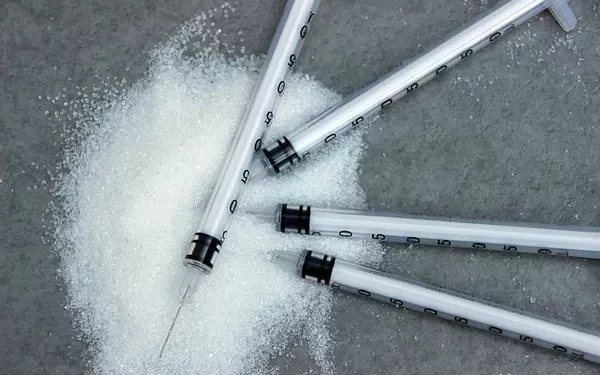Understanding Diabetes Mellitus
Diabetes mellitus encompasses a group of metabolic disorders characterized by chronic hyperglycemia resulting from defects in insulin secretion, insulin action, or both. The two primary types of diabetes are:
Type 1 Diabetes: Typically diagnosed in children and young adults, type 1 diabetes results from autoimmune destruction of pancreatic beta cells, leading to absolute insulin deficiency. Individuals with type 1 diabetes require lifelong insulin therapy for survival.
Type 2 Diabetes: This form of diabetes usually develops in adults and is associated with insulin resistance and relative insulin deficiency. Initially managed with lifestyle modifications and oral medications, many individuals with type 2 diabetes eventually require insulin therapy as the disease progresses.
Role of Insulin in Diabetes Management
Insulin, produced by beta cells in the pancreas, facilitates the uptake of glucose into cells, thereby lowering blood glucose levels. In diabetes, insulin therapy aims to mimic physiological insulin secretion and maintain blood glucose within target ranges to prevent complications. The therapeutic goals include:
- Normalization of Blood Glucose Levels: Insulin therapy aims to achieve near-normal blood glucose levels to reduce the risk of long-term complications such as cardiovascular disease, neuropathy, nephropathy, and retinopathy.
- Metabolic Control: By regulating glucose metabolism, insulin therapy helps prevent acute complications like diabetic ketoacidosis (DKA) in type 1 diabetes and hyperosmolar hyperglycemic state (HHS) in type 2 diabetes.
Mechanisms of Insulin Action
Insulin acts on various tissues to regulate glucose uptake, utilization, and storage:
- Liver: Inhibits gluconeogenesis and promotes glycogen synthesis.
- Muscle: Stimulates glucose uptake and glycogen synthesis.
- Adipose Tissue: Promotes glucose uptake and inhibits lipolysis.
The pharmacodynamics of exogenous insulin determine its onset, peak, and duration of action, influencing dosing schedules and therapeutic outcomes.
Types of Insulin Preparations
Insulin formulations vary in onset, peak, and duration of action, allowing tailored therapy:
- Rapid-Acting Insulin: Administered before meals to control postprandial glucose spikes.
- Short-Acting (Regular) Insulin: Given before meals to manage blood glucose levels throughout the day.
- Intermediate-Acting Insulin: Provides basal insulin coverage, reducing fasting hyperglycemia.
- Long-Acting Insulin: Provides a steady basal insulin level, mimicking physiological insulin secretion.
Advancements in insulin analogs have improved pharmacokinetics, reducing hypoglycemia risk and enhancing treatment adherence.
Insulin Therapy in Type 1 Diabetes
Type 1 diabetes necessitates exogenous insulin to maintain life:
- Basal-Bolus Regimen: Mimics physiological insulin secretion with long-acting basal insulin for background coverage and rapid-acting insulin for mealtime boluses.
- Continuous Subcutaneous Insulin Infusion (CSII): Insulin pump therapy delivers basal and bolus insulin via infusion, offering flexibility and precision in dosing.
Emerging technologies like closed-loop systems (artificial pancreas) automate insulin delivery, enhancing glycemic control and quality of life.
Insulin Therapy in Type 2 Diabetes
Initially managed with lifestyle interventions and oral agents, type 2 diabetes often progresses to require insulin therapy:
- Basal Insulin: Initiated to control fasting blood glucose, starting with once-daily dosing and titrating based on glucose levels.
- Basal-Bolus Therapy: Combines basal insulin with rapid-acting insulin before meals to manage postprandial glucose excursions.
Individualized treatment approaches account for patient characteristics, comorbidities, and preferences to optimize glycemic control and mitigate complications.
Challenges and Considerations
Effective insulin therapy hinges on several factors:
- Hypoglycemia: Risk management through glucose monitoring, individualized dosing, and patient education.
- Weight Gain: Addressed through dietary modifications, exercise, and insulin formulations with favorable weight profiles.
- Injection Site Reactions: Rotating injection sites minimizes discomfort and prevents lipohypertrophy.
Psychosocial factors, including patient beliefs, socioeconomic status, and access to healthcare, influence treatment adherence and outcomes.
Innovations and Future Directions
Ongoing research and technological advancements promise to revolutionize insulin therapy:
- Ultra-Rapid-Acting Insulin: Accelerated onset and shorter duration of action to mimic physiological insulin release.
- Smart Insulin Pens: Integrates glucose monitoring and insulin delivery, enhancing precision and adherence.
- Gene Therapy: Investigating novel approaches to restore beta cell function and improve insulin sensitivity.
The evolution towards personalized medicine aims to optimize diabetes management, tailoring therapies to individual needs and improving long-term outcomes.
See also: What Are The 3 Main Types Of Diabetes?
Conclusion
Insulin therapy remains indispensable in the management of diabetes mellitus, offering life-saving benefits and preventing complications. Advances in insulin formulations and delivery systems continue to refine treatment strategies, promoting glycemic control and enhancing quality of life for individuals with diabetes. Future research holds promise for further innovations, underscoring the dynamic landscape of diabetes care. As healthcare providers, understanding the complexities of insulin therapy empowers us to deliver personalized, effective care, mitigating the global burden of diabetes and improving patient outcomes.
In conclusion, the journey of insulin therapy in diabetes management epitomizes scientific progress and compassionate care, affirming its pivotal role in the pursuit of healthier futures for all individuals affected by diabetes mellitus.
Related topics:
What Are The 5 Types Of Diabetes?



























